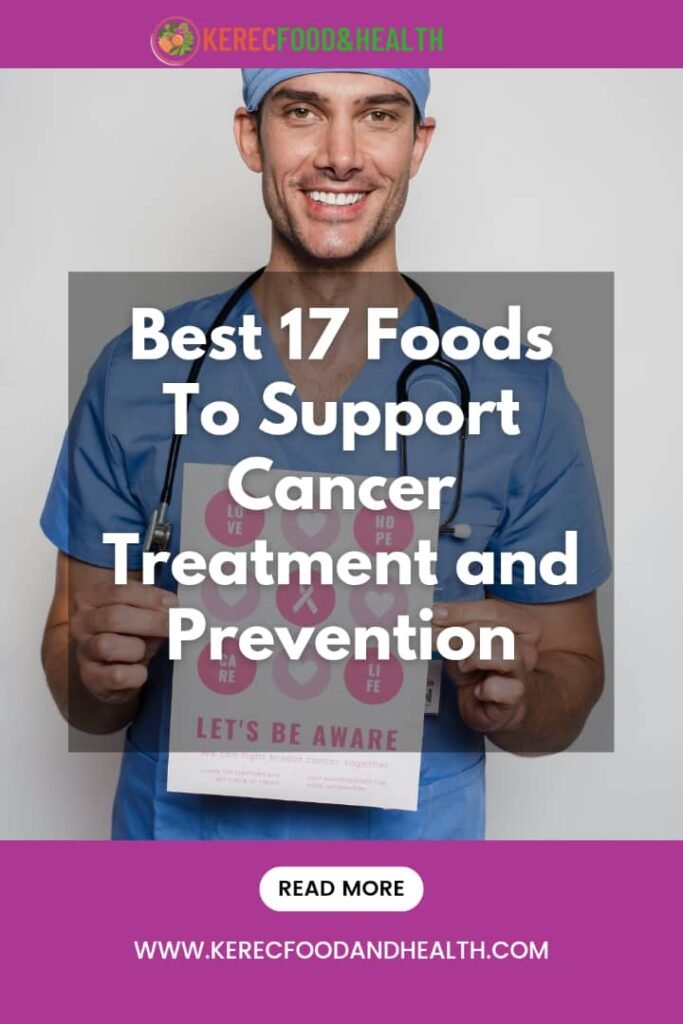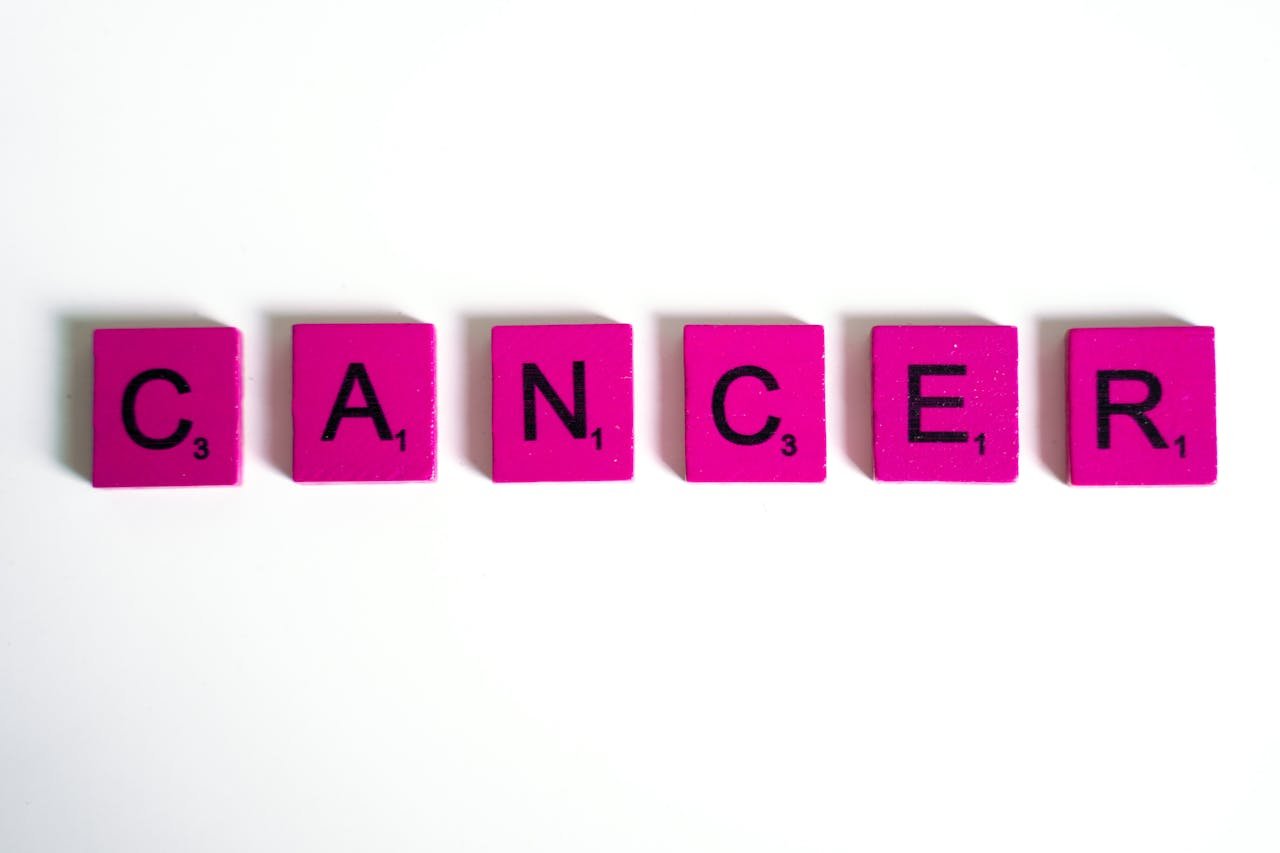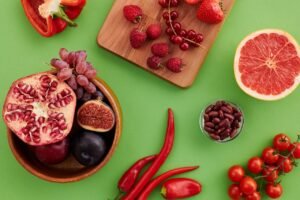While there is no specific food that can treat or prevent cancer on its own, but the right combination of foods may help make a difference. There are certain foods that may have potential health benefits and contribute to overall well-being during cancer treatment.
It’s important to note that these foods should always be part of a balanced diet and should not replace medical treatment. Here are some examples:

1. Fruits And Vegetables
Including a variety of colorful fruits and vegetables in your diet such as berries, cruciferous vegetables, mango, tomatoes, carrots, cucumber, pineapples, suawasoup, pear, avocado, bell pepper, bananas and citrus fruits can provide you with rich source of powerful antioxidants, vitamins, minerals, and fiber, which can help boost your immune system and protect your cells from damage. The more color in these foods, the more nutrients they contain.
The rich source of vitamins such as Vitamin C, A, E, B Complex, folate and others are associated with reduced risk of developing colon, stomach, pancreatic, and cervical cancers.
Most fruits and vegetables contain high levels of protective anti-oxidants such as carotenoids, anthocyanins, avocatin, cinnamic acid lutein, zeaxanthin, beta carotene, and vitamin E, which have anticancer properties that can protect against cancer progression, kill cancer cells, and stop the growth of prostate, oral, lung, stomach, leukemia, bladder and other types of cancer cells.
The dietary fiber in fruits and vegetables have potential anti-cancer effects by promoting healthy cell function and reducing inflammation.
2. Whole Grains
Foods like brown rice, whole-wheat bread, and quinoa are high in fiber and other beneficial compounds, which may help reduce the risk of certain cancers.
3. Legumes
Legumes such as beans, lentils, peas, and chickpeas are rich sources of plant-based proteins, antioxidants, fiber, and phytochemicals, which have anticancer effects and may lower the risk of some types of cancer such as breast, colorectal cancer.
People who consume fiber content are less likely to develop breast cancer than those who did not meet their daily fiber intake.
Legumes contains several potent phytochemicals that may protect the body’s cells against damage that can lead to cancer. They can as well slow tumor growth and prevents tumors from releasing substances that damage nearby cells.
4. Green Tea
Green tea is rich in antioxidants called catechins, which have been linked to a lower risk of certain types of cancer.
They contains high levels of compounds called polyphenols, which have the potential in reducing the risk of various cancers.
It also contains other bioactive compounds that may help slow the growth of cancer cells.
Studies have shown that green tea has slowed or prevented the development of cancer in colon, liver, breast, and prostate cells.
5. Fatty Fish
Fatty fish, such as salmon, anchovies, mackerel, sardines, tuna, and herring are rich in vitamin B, potassium, and omega-3 fatty acids.
Omega-3 fatty acids have been associated with a lower risk of certain cancers like prostate cancer.
People lots of freshwater fishes have a lower risk for colorectal cancer. While people who consume fish oil may have significantly lower risk for colon and prostate cancer.
6. Turmeric
The active compound in turmeric, called curcumin, has potent anti-inflammatory, antioxidant and anticancer properties properties, which may help protect against cancer development.
It’s commonly used in Indian cuisine and may be beneficial when consumed as part of a balanced diet.
7. Garlic And Onions
Both garlic and onions contain sulfur compounds that have been studied for their potential anticancer properties. It may also help to boost the immune system.
Garlic and onions can block the formation of nitrosamines, a powerful carcinogen that can target several sites in the body, usually the colon, liver, and breasts.
The sulfur compounds in garlic and onions may help reduce the risk of stomach, colorectal, and prostate cancers.
8. Cruciferous Vegetables
Cruciferous vegetables like broccoli, cauliflower, kale, Brussels sprouts, bok choy, and cabbage contain beneficial compounds that may your body defend against certain types of cancers such as colon, breast, lung, and cervix. They are also rich in vitamins and minerals such as vitamin C, vitamin K, and manganese.
Cruciferous vegetables contain sulforaphane compound which have anticancer properties, that can significantly inhibit cancer cell growth and stimulates cell death in colon cancer cells.
Sulforaphane in combination with genistein can significantly inhibit breast cancer tumor development and size. Sulforaphane can also inhibits histone deacetylase enzyme, which is link to cancer development.
9. Berries
Berries like blueberries, strawberries, and raspberries are packed with antioxidant called ellagic acid that may help reduce the risk of cancer. They are also a rich source of fiber, vitamins, and minerals.
Anthocyanin, flavonoids, and other antioxidants compounds found in berries, can help prevent or slow the development of cancer, reverse the process of early cell changes and also lower biomarkers for colon cancer. These antioxidants may help fight cancer by destroying free radicals before they can cause damage to cells. The anti-inflammatory effects of blueberries can prevent the growth of breast cancer tumors.
10. Healthy Fats
Foods rich in healthy fats like avocados, nuts, seeds, and olive oil can provide important nutrients and anti-oxidants that have anti-cancer properties and can support your overall health.
11. Carrots
Carrots excellent source of vitamins, minerals and antioxidant such as carotenoids, flavonoids, and phenolic acids. These essential nutrients like vitamin K, vitamin A, and antioxidants usually protect the body against cellular damages that are caused by free radicals. As they fight off harmful free radicals in the body system, which can make you less likely to have cancer.
Carotenoids are responsible for the orange and yellow colors of carrots, while anthocyanins are responsible for red and purple coloring. Anthocyanins and carotenoids antioxidants have anticancer properties that have the potency to reduce the risk of prostrate, breast, leukemia, stomach, colon, colorectal, and lung cancer.
Carrots also contain another carotenoid called lycopene which has the potential to fight against stomach, prostate, lung, and breast cancer.
The beta-carotene in carrots plays a significant role in supporting the body’s immune system and in preventing or reducing the risk of certain types of cancer such as stomach, breast and prostate cancer.
12. Apples
It turns out there may be some truth to the age old saying, “An Apple a day keeps doctor away.”
Apples are excellent source of antioxidants that can offer beneficial effects against certain types of cancers such as lung, breast, and digestive tract cancers.
Regular consumption of apple can lower your chances of getting cancer. Research has revealed that apple contains a plant-based compounds called polyphenols, which can keep cancerous cells from multiplying and may prevent inflammation and infections.
Polyphenols can also modulate certain processes that can lead to cancer development. It can inhibit glucose transporter 2 (GLUT2), which plays a vital role in advanced-stage cell growth in certain types of cancer.
Apple also contains phloretin anti-oxidants, which can significantly inhibit the growth of breast cancer cells while not affecting the healthy cells.
13. Nuts
According to the American Institute for Cancer Research, all nuts tend to have cancer-preventing properties,
Walnuts contain a substance called pedunculagin, which the body metabolizes into urolithins. Urolithins compounds can bind to estrogen receptors and may play a significant role in preventing breast cancer.
Researchers has revealed that nuts such as walnuts can suppress the growth of cancerous cell.
14. Grapes
Grapes and grape juice, especially the red and purple grapes skins contain an antioxidant called resveratrol, which have strong antioxidant and anti-inflammatory properties, with the potential to fight cancer.
Grape seeds also contain phenolic acids, anthocyanins, flavanols, proanthocyanidins, tannin and catechins which have antioxidant and possibly cancer-fighting properties.
15. Tomatoes
The pigment that gives tomatoes its red color is called lycopene, which have been linked to reduce the risk of several types of cancer, such as prostate and lung cancer.
Processed tomato products such as juice, sauce, or paste have increase cancer-fighting potential. Cooking tomatoes can release the lycopene and makes it available to your body.
16. Limit Alcohol Intake
Drinking alcohol can raise the risk for cancer of the colon, rectum, mouth, throat, larynx, esophagus, liver, and breast.
Although, the American Cancer Society do recommend against drinking alcohol, but if you do, alcohol intake should be limited to no more than two drinks per day for a man and one drink per day for a woman.
Women who are at higher risk for breast cancer should consult your doctor about what amount of alcohol, if any, is safe based on their personal risk factors.
17. Dark Leafy Greens
Dark leafy greens such as kale, chicory, mustard greens, lettuce, spinach, and chard are excellent source of fiber, folate, and carotenoids.
These nutrients and anti-oxidants in these leafy greens may help protect against cancer of the mouth, larynx, pancreas, lung, skin, and stomach.
Bottom Line
Remember, while incorporating these foods into your diet may have potential benefits, it’s also crucial to maintain an overall healthy lifestyle, including regular exercise, avoiding tobacco and excessive alcohol consumption, and maintaining a healthy weight.
Additionally, always consult with a healthcare professional for personalized advice and regular screenings, or a registered dietitian who specializes in oncology nutrition to create a personalized diet plan that suits your specific needs when dealing with cancer.
Source
- Marie Lorraine Johnson and Jamie Eske March 20, (2023). What are cancer-fighting foods? https://www.medicalnewstoday.com/articles/324193.
- Minesh Khatri. April 24, (2022). Top Cancer-Fighting Foods. https://www.webmd.com/cancer/ss/slideshow-cancer-fighting-foods.
- Eric Metcalf and Krystal Cascetta. January 5, (2018). The Anti-Cancer Diet: Foods That Prevent Cancer. https://www.everydayhealth.com/cancer-photos/top-foods-to-fight-cancer.aspx
- AICR’s Foods that Fight Cancer. https://www.aicr.org/cancer-prevention/food-facts/






Pingback: Top 20 Foods to Reverse Kidney Disease